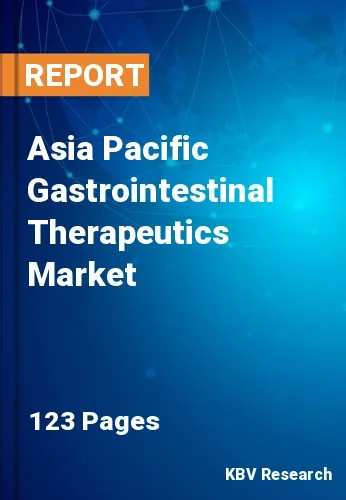
The Asia Pacific Gastrointestinal Therapeutics Market would witness market growth of 4.7% CAGR during the forecast period (2022-2028).
Gastrointestinal disorders are among the most common complaints made to a primary care physician globally and are also connected with the substantial healthcare and economic burden. However, despite the prominent healthcare and financial burden of GI disorders, many digestive diseases are still under-researched.
In addition, the treatment options are not beneficial enough, leaving the patients dissatisfied with their present treatment. Thus, from a volume/value point of view, the significant area of unmet requirement and room for further development, combined with the large share of the pharmaceutical sector, make the GI therapeutics market an attractive target for therapeutic effect, where the development of new, affordable, and innovative, effective treatments could provide greater patients satisfaction, higher profit returns, and decreased economic burden.
In patients with GORD, one of the largest and fastest growing GI segments, the liquid content of the stomach regurgitates back up into the esophagus, causing ulcerations of the esophagus. The predominant symptom of which is the unpleasant sensation of heartburn, prominently at night. Acid suppressants used in the treatment of GORD include proton pump inhibitors, histamine H2 receptor antagonists, and antacids; however, proton pump inhibitors (PPI) have emerged as the most effective option for treatment.
Disease and illnesses of the gastrointestinal system have increased significantly in the last decade because of the considerable lifestyle changes. People with gastrointestinal illness have a high prevalence of depression, impaired central nervous system functioning, anxiety, and stress. The overall majority of self-reported gastrointestinal problems was 18%, with prominent variations among regions, and it increased with the rising age. Adults from the age group 45-54 and 55-64 years were prominently more prone to have gastrointestinal problems when compared to people below 44 years of age.
The China market dominated the Asia Pacific Gastrointestinal Therapeutics Market by Country in 2021, and would continue to be a dominant market till 2028; thereby, achieving a market value of $3,846.3 million by 2028. The Japan market is experiencing a CAGR of 4.1% during (2022 - 2028). Additionally, The India market would display a CAGR of 5.3% during (2022 - 2028).
Based on Type, the market is segmented into Branded and Generics. Based on Distribution Channel, the market is segmented into Retail Pharmacies, Hospital Pharmacies and Online Pharmacies. Based on Route of Administration, the market is segmented into Injectable and Oral & Others. Based on Application, the market is segmented into Crohn's Disease, Ulcerative Colitis, GERD, IBS and Others. Based on Drug Class, the market is segmented into Biologics/Biosimilar, Anti-Diarrheal, Anti-Emetics, Digestive Enzymes, Aminosalicylates, Proton Pump Inhibitors, Laxatives & H2 Antagonists and Others. Based on countries, the market is segmented into China, Japan, India, South Korea, Singapore, Malaysia, and Rest of Asia Pacific.
Free Valuable Insights: The Worldwide Gastrointestinal Therapeutics Market is Projected to reach USD 45.9 Billion by 2028, at a CAGR of 3.8%
The market research report covers the analysis of key stake holders of the market. Key companies profiled in the report include Abbott Laboratories, AbbVie, Inc., Takeda Pharmaceutical Company Limited, Pfizer, Inc., Salix Pharmaceuticals, Inc. (Bausch Health Companies, Inc.), Johnson & Johnson (Janssen Global Services, LLC), AstraZeneca PLC, Bayer AG, Sun Pharmaceutical Industries Ltd., and Cipla Limited.
By Type
By Distribution Channel
By Route of Administration
By Application
By Drug Class
By Country
Our team of dedicated experts can provide you with attractive expansion opportunities for your business.
